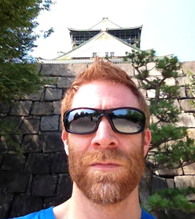 Is there a link between the Fukushima nuclear meltdown and cancer?
Is there a link between the Fukushima nuclear meltdown and cancer?
Alexander Bay, associate professor in the department of history at Chapman University, looks into the link between the radiation and thyroid cancer among children.
When I began teaching at Chapman University in August 2006, I had an established research trajectory focusing on the history of public health in Japan. My first book, Beriberi in Modern Japan, published in December, 2012, by the University of Rochester Press as part of the Rochester Studies in Medical History, grew out of my Stanford PhD dissertation. I produced an initial articulation of this project for the refereed journal Japan Review: Journal of the International Research Center for Japanese Studies. My article, “Beriberi, Military Medicine, and Medical Authority in Prewar Japan,” appeared in the fall 2008 issue. I spent the 2008-2009 academic year in Japan during which a Japan Society for the Promotion of Science Postdoctoral Fellowship funded further research for and the writing of my book. In addition to journal articles and book monographs, I have presented original research at the annual meetings of the Association for Asian Studies, the History of Science Society, East Asian Science, Technology and Society, and the Japan Society for the History of Medicine. I have also written book reviews for The Pacific Circle, the Journal of the Japanese Society for the History of Medicine, First World War Studies, East Asian Science, Technology and Society: An International Journal, and The Journal of Asian Studies, and have acted as an peer reviewer for East Asian Science, Technology and Society: An International Journal.
During the summer of 2010, I began initial work on second project concerning the history of the environmental impact on digestive system disorders. I presented early versions of this study at the Association for Asian Studies annual meeting, the Science, Technology, and Medicine in East Asia: Policy, Practice, and Implications in a Global Context conferencAlex Bay kickboxinge at The Ohio State University and at a University of North Carolina Asian Studies Program lecture series in 2011. Based on these conference presentations and academic talks, an editor of Historia Scientiarum, the English-language journal for the History of Science Society of Japan, asked me to contribute to a special issue dedicated to the history of Japanese medical history. The editor now has my article draft. I received a summer 2012 Travel/Research Grant from the D. Kim Foundation for the History of Science in East Asia to further research this topic. Tentatively entitled Nation from the Bottom Up: Disease, Toilets and Waste Management in Modern Japan, this project concerns the history of environmental hygiene and digestive-system diseases including dysentery, typhoid fever, hemorrhoids and parasite-diseases like schistosomiasis as well as the technology of waste-management in Japan from 1900 to 1980.
Fukushima Nuclear Meltdown and Thyroid Cancer in Children
After the March 11, 2011, earthquake and tsunami induced triple meltdowns at the Fukushima Dai’ichi Nuclear Power Plant, Fukushima Prefecture began a Health Survey to test the thyroid glands of children under 18. The survey uncovered a large number of thyroid abnormalities. At present, there are 1,819 cases of childhood thyroid abnormality in Fukushima prefecture alone. As of 2016, there are 166 cases of thyroid cancer detected through cytology. Medical statistics suggest that this is an unnatural deviation from the baseline of 1 or 2 in one million. The Health Survey; however, argues that these new cases are the result of a “screening effect:” Because the Health Survey is actively checking children, it is finding more cases that fall within the baseline numbers for thyroid cancer. The take-home message is that there is no causal link between the Fukushima meltdowns, the amount of radiation released and these cancers.
The history of how the tobacco industry constructed ignorance concerning the link between smoking and cancer helps highlight the Japanese government’s campaign to spread doubt and uncertainty about the health effects of radiation and childhood cancer.
Studies sympathetic to the nuclear-power industry often excluded data on the health effects concerning non-human subjects. This discourse resonates with language used by the tobacco industry to cast doubt and uncertainty over the discussion of the health effects of smoking: Animal experiments cannot prove that smoking caused cancer because they do not reflect the human condition. The Survey noted in 2014 that the accident produced no reactions in tissue despite numerous peer-reviewed studies showing that artificial radiation from Fukushima caused genetic damage in butterfly species. Scientific research; however, has shown that even low-dose exposure increases the risks of cancer. We are unfortunately seeing effects of this in the children of Fukushima Prefecture.

Comments
2 responses to “Alexander Bay, Chapman University – Fukushima Nuclear Meltdown and Thyroid Cancer in Children”